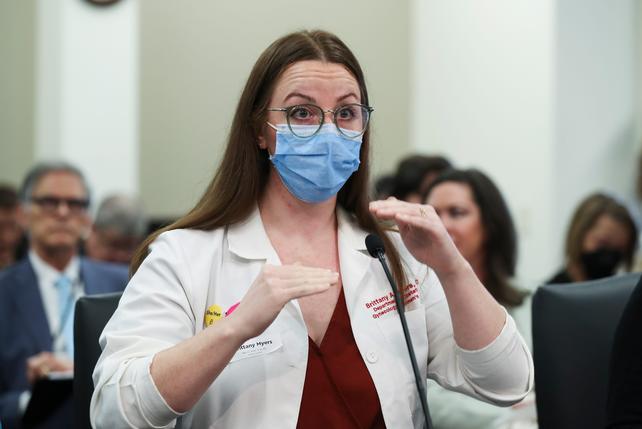Just one week removed from a 14-hour hearing in the House Health & Insurance Committee, it was the Colorado Senate Judiciary Committee's turn for a late-night hearing on House Bill 1279, the Reproductive Health Equity Act.
The Senate hearing was only minutes shorter, wrapping up just after midnight Friday morning. More than 200 witnesses signed up to testify, with a ratio of roughly 3-to-1 against the bill.
The committee approved HB 1279 on a party-line 3-2 vote. It was not amended during the hearing and now goes to the full Senate, which is expected to review it next week.
HB 1279 declares that every pregnant individual has a "fundamental right" to continue the pregnancy or undergo an abortion, and that every individual has a fundamental right to use or refuse contraception. The bill also declares that a "fertilized egg, embryo, or fetus does not have independent or derivative rights under the laws ofthe state."
Sponsors, including Sen. Julie Gonzales, D-Denver, have said that Colorado law does not explicitly protect the right to abortion, and that two pending U.S. Supreme Court decisions, expected in June, could overturn Roe v. Wade.
After a six-week abortion ban went into effect in Texas, she showed up at the Colorado state Capitol for a rally. The feeling of unsettledness among those who support abortion rights was palpable, she said. Coloradans shared their stories, including those who remember the days before Roe v. Wade.
She was asked what she would do, and HB 1279 was the answer, she said.
"This bill is our response to the anti-abortion attacks" that have moved through courts and conservative state legislatures, including from conservatives in Colorado. That's despite voter rejection of four ballot measures between 2008 and 2020, and 44 bills during that same period that attempted to end abortion in Colorado.
Sen. Bob Gardner, R-Colorado Springs, who is also a Texas native, said he questions the legality of the Texas law. He asked whether the bill will change the "state of the law" in Colorado.

Gardner said when you look at what has happened in the two legal challenges pending before the Supreme Court — a 15-week ban in Mississippi and 8 weeks in Texas — the question Colorado must contend with is to protect an individual's decision on whether to carry a pregnancy or have an abortion.
"That decision is crucial here," he said.
The arguments presented Thursday mirror many of those offered last week, and by many of the same people and organizations.
Those who argued against the bill said abortion is eugenics, that women should not use abortion as a form of birth control, that women who are victims of human trafficking are being forced into abortions, and that the fetus is a unique human being with rights. They also raised concerns centering on the bill overturning the state's 2003 parental notification law, which is disputed by supporters.
Theresa Aughenbaugh of Colorado Right to Life told the Senate committee that the stories they hear from women who have had abortions, regardless of the reason for it, all end the same: "with a dead baby." The debate, she said, is about the baby's right to life and a woman's autonomy and that's weighed against another person's life.
Colorado Right to Life is among several organizations threatening to sue if the bill becomes law.
Tina Hustin said those testifying in favor of HB 1279 are narcissistic and selfish, lacking in responsibility and "posses collective sociopathic attitudes that give more reference to the dirt under their feet" than the unborn. Charles Baca told the committee that statistical evidence shows "women are being abused" through abortion, and that he was there to promote the welfare of women.
The other side included those representing Planned Parenthood, women's organizations, and women who have had abortions for a multitude of reasons.
Marlee Breakstone of Catholics for Choice said the majority of Catholics disagree with the Colorado Catholic Conference about this bill. This bill is not radical, she added. Ultimately, one in four abortion patients is Catholic and access to reproductive health care is a "blessing."
Claudia Perez of Planned Parenthood of the Rocky Mountains said millions of people have seen their rights to reproductive health care restricted. Her organization's clinics are already seeing a huge uptick in patients from Texas. Neighbors from Arizona, Nebraska, Oklahoma, Kansas and Wyoming, where Gov. Mark Gordon signed a law on Tuesday that would outlaw abortion, five days after the Supreme Court overturns Roe v. Wade.
Colorado has the opportunity in reproductive rights to lead for 36 million women, Perez said. Abortion is healthcare and Colorado is a safe haven for reproductive rights, she added.









